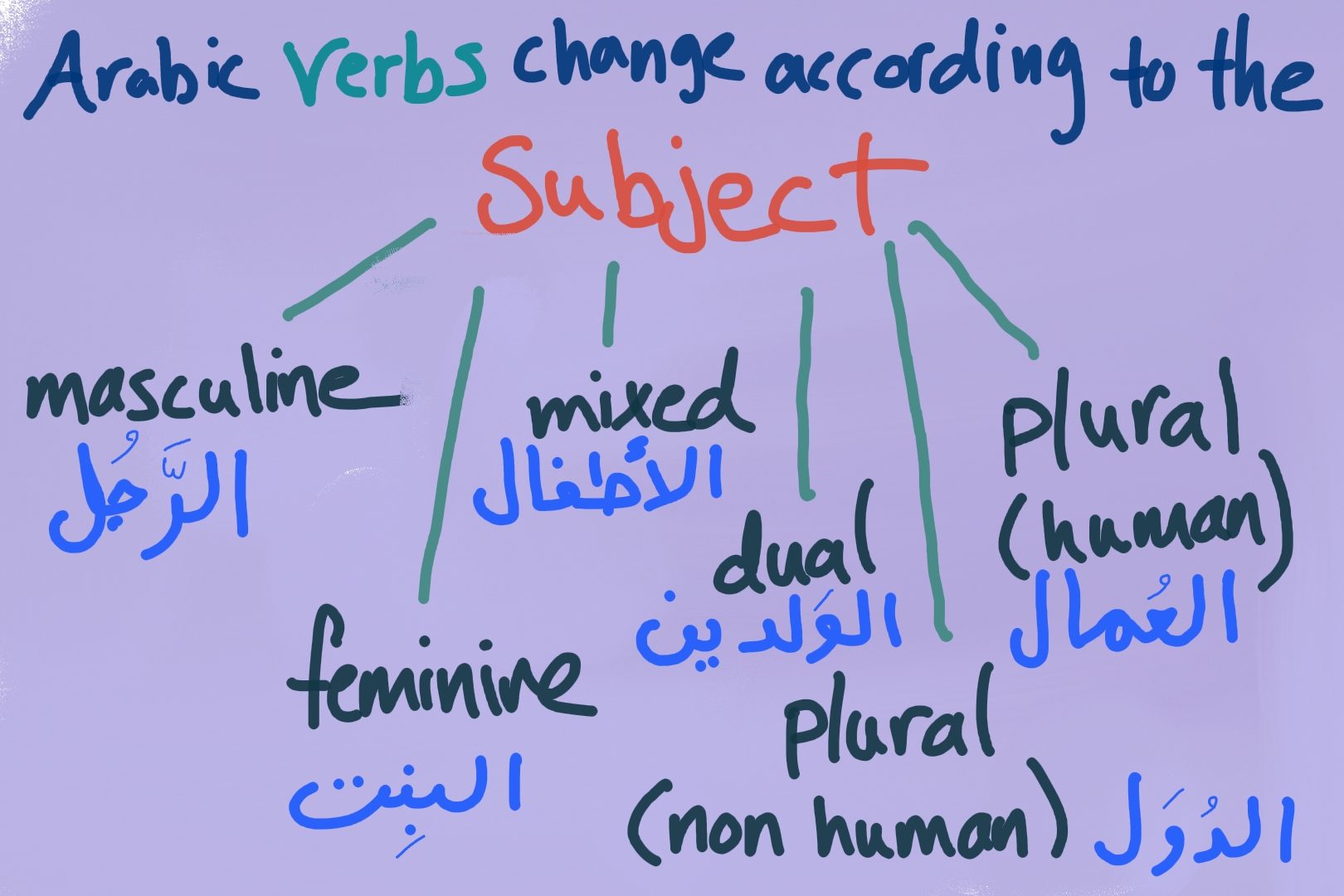Key Points for Making Arabic Sentences with Verbs Posted by yasmine on Oct 13, 2021 in Arabic Language, Grammar
In this post, I thought we’d look at the basic essential points for creating Arabic sentences using verbs. If you happen to already be familiar with these points, perhaps it can serve as a review. 🤓
🎇First of all, Arabic verbs change according to the subject (who/what) is carrying out the action.
✨Here we have two sentences where the subject is masculine and the other feminine. Notice the different endings.
.كَتَبَ يوسف مَقالة عَن قَوَاعد اللُغة العَرَبية
Yousef wrote an article on the grammar of Arabic language.
.كَتَبَت سارة مَقالة عَن قَواعِد اللُغة العَرَبية
Sarah wrote an article on the grammar of Arabic language.
✨If the subject is a mixed group of male and female people, the masculine is used:
.الأولاد والبَنات خَرَجوا مِن المَدْرَسة
✨There are also different endings/beginnings for two people or things (the dual). For example:
.العائِلتان هاجَرَتا إلى تُركيا بَعْد الحَرْب
The two families emigrated to Turkey after the war.
.هذان الوَلدان يَكْتُبان
These two boys are writing.
✨The plural verbs are only used for people. If the subject of a verb is plural but not human, (three or more things) we use the feminine singular:
.وَقَعَت الصُّحون على الأرْض وانْكَسَرَت
The plates fell on the floor and broke.
.المَراكِز الطِّبية لا تُغْلَق يَوْم الأحد
Medical centers do not close on Sundays.
✨If the subject is a group of people, the verb will still be singular if it comes before the subject. It will only change according to whether the subject is masculine or feminine.
.وَصَلَ الرِجال إلى الإجتماع
The men arrived at the meeting.
.بَدَأت الطالِبات اجتماعهُنَّ
The (female) students began their meeting.
✨Because the prefixes and suffixes (letters at the beginning and end of the verb) tell you the subject, Arabic does not often use personal pronouns with verbs such as أنا and هو. If they are used, it is usually for emphasis and comes after the verb:
.دَخَلَ أخي جامِعة بَيروت في عام ٢٠٠٥، ثُمَّ بَعْدَ سَنتين دَخَلْتُ أنا
My brother attended Beirut University in 2005, then two years later I too attended.
✨The verb can come before or after the subject. This is largely a matter of emphasis/level of formality. If the sentence starts with a subject, you might see the word إن first. This word is added for emphasis but has no direct translation.
.كَتَبَ خالِد رِسالة للمُدير
.إن خالِداً كَتَبَ رِسالة للمُدير
Both translate to: Khalid wrote a letter to the manager.
✨Look at the next sentences. They have two verbs, before and after the subject.
.حَضَرَ المُدَرسون اجتماعاً واتفَقوا على البَرنامج الجَديد
The teachers attended a meeting and agreed on the new program.
.دَرَسَت البَنات للامتحان، ثُم خَرَجْنَ
The girls studied for the exam and then went out.
Let’s analyze these sentences.
The subject of the first sentence above is masculine plural مُدرسون. The first verb َحَضَر has the masculine singular ending because it comes before the subject. The second verb اتفقوا has the plural ending وا since it comes after the subject.
The same is true for the second sentence, except that the subject is feminine plural البنات and so the feminine singular ending with درست and feminine plural ending ن for َخَرجن is used.
These are the basic guidelines for using verbs in sentences. I hope this post can serve as a quick reference when creating your own sentences in Arabic. Till next week, happy Arabic learning! 😊

Keep learning Arabic with us!
Build vocabulary, practice pronunciation, and more with Transparent Language Online. Available anytime, anywhere, on any device.





Comments:
Muhammad Feroze Khan:
Excellent! Thanks a lot Madam for sharing with us who are regular beneficiary from your contributions.
Rosie:
Yasmine! Useful post. Thanks for sharing this informative post with us.